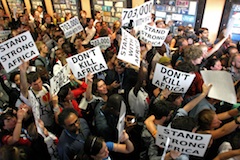Faith leaders spearhead climate change challenge
December 16, 2011:
 |
 |
 |
Going green: A young participant at the Climate Change Conference in Durban. Picture: WWF/Peter McKenzie |
Faith leaders joined forces this month to urge decision-makers to act in the interest of humanity to reach an agreement on global climate change.
Failure to do so ‘will cause human suffering on a terrifying scale’, according to Christian Aid’s climate exert Mohamed Adow.
The United Nations’ Climate Change Conference (Conference of Parties 17) held in Durban, South Africa, from November 29 - December 9 was attended by 10,000 people representing the world's governments, international organisations and civil society.
African faith leaders played a major role in the talks with the All Africa Conference of Churches (AACC), which represents more than 120 million Christians in 39 African countries, having a strong presence at the event.
Unveiling the Interfaith Declaration on Climate Change, peace activist Ela Gandhi quoted her grandfather, Mahatma, when she called upon delegates to ‘be the change you want to see in the world’.
She said those in power needed to make decisions that help to conserve the planet for future generations.
Cardinal Wilfrid Napier, Roman Catholic Archbishop of Durban, said that the world's political leaders were in danger of failing humanity.
‘We express our displeasure with local and international political leadership, which has failed to take decisive steps to make the changes required for the survival of humanity and life on Earth,’ he said. ‘We as the religious community demand that our political leaders honour previous commitments and move towards ethically responsible positions and policies.’
 |
 |
 |
Rallying cry: Protesters fear a 'death sentence for Africa' outside the Climate Change Conference talks in Durban. Picture: WWF/Peter McKenzie |
The Cardinal urged the global spiritual community to do what their political leaders had failed to do and not accept platitudes instead of action on climate change.
Mardi Tindal, leader of the United Church of Canada, the country's largest Protestant denomination, said Jesus's call to love one's neighbour spoke directly to global decisions on the environment.
She said: ‘When Jesus was asked what the greatest commandment was he said, “Love the Lord your God with all your heart and with all your soul and with all your strength and with all your mind,” and he added, “Love your neighbour as yourself."
‘We can't be compassionate followers of Christ without being concerned by the threat of climate change and its impact on our global neighbours,"
Fellow Canadian the Rev Willard Metzger, the General Secretary of the Mennonite Church of Canada, added that environmental responsibility was an act of worship.
Treat the Earth with respectHe said: ‘Caring for the Earth is a form of worship to God the Creator. God put passion and energy into creating something beautiful for his children. How can we do anything but treat it with respect? Anything else would be an insult.’
UK-based global development agency Christian Aid's climate talks expert Mohamed Adow said that if nothing is done, human suffering on a huge scale would be the consequence.
‘We want to leave Durban with a deal which is a strong response to the climate chaos which is hurtling towards us - and which is already having devastating effects on poor people,’ he explained.
‘Governments need to agree how to respond to the latest climate science, which shows that without deep emissions cuts now, dangerous global warming will occur. It will cause human suffering on a terrifying scale,' said Adow.
 |
| ‘For most people in the developing world and Africa, climate change is a matter of life and death.' – President Zuma |
|
 |
 |
The conference was held to seek to advance the implementation of the Convention and the Kyoto Protocol, as well as the Bali Action Plan, agreed upon at COP 13 in 2007, and the Cancun Agreements, reached at COP 16 in December 2010.
South African President Jacob Zuma opened the conference and called on all parties involved in the negotiations to work diligently to find a solution to the climate issues.
‘For most people in the developing world and Africa, climate change is a matter of life and death,’ he said. ‘We are always reminded by the leaders of small island nations that climate change threatens their very existence.
President Zuma claimed that climate change will reduce agricultural output by 50 per cent across the African continent. He drew attention to the fact that ‘severe drought in Somalia is exacerbating an already volatile region causing displacement of populations and increasing refugee communities in Kenya.’
The Guardian newspaper reported that two weeks of talks – the last 60 hours of which was a single marathon negotiating session, with officials holed up in a conference centre through three nights with scarcely a break – ended with a surprise decision struck during a tea break just before dawn on Sunday. (December 11).
 |
| 'Governments have paid little heed to repeated warnings from the scientific community that much stronger, urgent action is needed to cut emissions.' – Keith Allsott WWF-UK |
|
 |
 |
The report continued: ‘A small huddle of key ministers were ordered to meet for 20 minutes and thrash out their differences. With tempers rising and the talks minutes from being abandoned, the chair, South African foreign minister Maite Nkoana-Mashabane, ordered China, India, the US, Britain, France, Sweden, Gambia, Brazil and Poland to meet in a small group. Surrounded by nearly 100 delegates on the floor of the hall, they talked quietly among themselves to try to reach a new form of words acceptable to all.
‘The agreement – dubbed the "Durban platform" – is different from the other partial deals that have been struck during the past two decades, with developing countries, including China, the world's biggest emitter, agreeing to be legally bound to curb their greenhouse gases. Previously, poorer nations have insisted that they should not bear any legal obligations for tackling climate change, whereas rich nations – which over more than a century have produced most of the carbon currently in the atmosphere – should.
Pact must have 'legal force'‘Another first is that the US, the second biggest emitter, also agreed that the new pact would have "legal force" – a step it flirted with in 1997 with the Kyoto protocol, but abandoned as Congress made clear it would never ratify that agreement.
‘All of the world's biggest economies and emitters already have targets to cut emissions between now and 2020, when the new deal would come into force.
‘But those targets are voluntary, not legally binding. This is a crucial difference for the EU and many others, who fear that voluntary targets are too easy to wriggle out of.
‘Keith Allsott, head of climate change at WWF UK, said: "Governments have salvaged a path forward for negotiations, but we must be under no illusion – the outcome of Durban leaves us with the prospect of being legally bound to a world of 4C warming.
"This would be catastrophic for people and the natural world. Governments have spent crucial days focused on a handful of specific words in the negotiating text, but have paid little heed to repeated warnings from the scientific community that much stronger, urgent action is needed to cut emissions." '
To read more reports from COP 17, link here.
|

